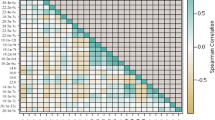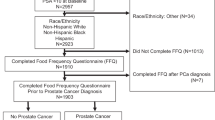Abstract
Objective
Dietary fat, including specific fatty acids, has been proposed to contribute to prostate cancer pathogenesis, but findings from the studies based on biomarkers have been conflicting.
Methods
We examined the association between erythrocyte membrane fatty acid composition and prostate cancer risk in a nested case–control study within a multiethnic cohort of African Americans, Native Hawaiians, Japanese Americans, Latinos, and Whites. Analyses included 376 cases and 729 matched controls. Conditional logistic regression was used to estimate the odds ratios and 95% confidence intervals with adjustment for multiple covariates.
Results
No significant association was found for saturated, mono- and polyunsaturated fatty acid, or for specific n-3 and n-6 fatty acids, even when the analysis was limited to advanced or high grade prostate cancer. In ethnic specific analyses, there was a positive association with palmitic acid in Japanese Americans that was significantly different from the null results in other groups. There was also an increased risk with n-3 fatty acids and the ratio of n-3/n-6 fatty acids in Whites.
Conclusion
Although there was a suggestion of ethnic specific associations with some fatty acids, our overall findings do not support a role for fatty acids in prostate carcinogenesis.
Similar content being viewed by others
References
Kolonel LN, Nomura AM, Cooney RV (1999) Dietary fat and prostate cancer: current status. J Natl Cancer Inst 91:414–428
Kolonel LN (2001) Fat, meat, and prostate cancer. Epidemiol Rev 23:72–81
Fleshner N, Bagnell PS, Klotz L, Venkateswaran V (2004) Dietary fat and prostate cancer. J Urol 171:S19–S24
Larsson SC, Kumlin M, Ingelman-Sundberg M, Wolk A (2004) Dietary long-chain n-3 fatty acids for the prevention of cancer: a review of potential mechanisms. Am J Clin Nutr 79:935–945
Rose DP (1997) Effects of dietary fatty acids on breast and prostate cancers: evidence from in vitro experiments and animal studies. Am J Clin Nutr 66:1513S–1522S
De Stefani E, Deneo-Pellegrini H, Boffetta P, Ronco A, Mendilaharsu M (2000) Alpha-linolenic acid and risk of prostate cancer: a case–control study in Uruguay. Cancer Epidemiol Biomark Prev 9:335–338
Ramon JM, Bou R, Romea S et al (2000) Dietary fat intake and prostate cancer risk: a case–control study in Spain. Cancer Causes Control 11:679–685
Leitzmann MF, Stampfer MJ, Michaud DS et al (2004) Dietary intake of n-3 and n-6 fatty acids and the risk of prostate cancer. Am J Clin Nutr 80:204–216
Kristal AR, Cohen JH, Qu P, Stanford JL (2002) Associations of energy, fat, calcium, and vitamin D with prostate cancer risk. Cancer Epidemiol Biomarkers Prev 11:719–725
Augustsson K, Michaud DS, Rimm EB et al (2003) A prospective study of intake of fish and marine fatty acids and prostate cancer. Cancer Epidemiol Biomark Prev 12:64–67
Bidoli E, Talamini R, Bosetti C et al (2005) Macronutrients, fatty acids, cholesterol and prostate cancer risk. Ann Oncol 16:152–157
Koralek DO, Peters U, Andriole G et al (2006) A prospective study of dietary alpha-linolenic acid and the risk of prostate cancer (United States). Cancer Causes Control 17:783–791
Neuhouser ML, Barnett MJ, Kristal AR et al (2007) (n-6) PUFA increase and dairy foods decrease prostate cancer risk in heavy smokers. J Nutr 137:1821–1827
Nagata Y, Sonoda T, Mori M et al (2007) Dietary isoflavones may protect against prostate cancer in Japanese men. J Nutr 137:1974–1979
Liu X, Schumacher FR, Plummer SJ et al (2007) Trans-fatty acid intake and increased risk of advanced prostate cancer: modification by RNASEL R462Q variant. Carcinogenesis 28:1232–1236
Wallstrom P, Bjartell A, Gullberg B, Olsson H, Wirfalt E (2007) A prospective study on dietary fat and incidence of prostate cancer (Malmö, Sweden). Cancer Causes Control 18:1107–1121
Willett WC (1998) Nutritional epidemiology. Oxford University Press, New York, pp 217–226
Arab L, Akbar J (2002) Biomarkers and the measurement of fatty acids. Public Health Nutr 5:865–871
Park SY, Murphy SP, Wilkens LR, Henderson BE, Kolonel LN (2007) Fat and meat intake and prostate cancer risk: the multiethnic cohort study. Int J Cancer 121:1339–1345
Kolonel LN, Henderson BE, Hankin JH et al (2000) A multiethnic cohort in Hawaii and Los Angeles: baseline characteristics. Am J Epidemiol 151:346–357
Bagga D, Capone S, Wang HJ et al (1997) Dietary modulation of omega-3/omega-6 polyunsaturated fatty acid ratios in patients with breast cancer. J Natl Cancer Inst 89:1123–1131
Zock PL, Katan MB (1998) Linoleic acid intake and cancer risk: a review and meta-analysis. Am J Clin Nutr 68:142–153
Pandian SS, Eremin OE, McClinton S, Wahle KW, Heys SD (1999) Fatty acids and prostate cancer: current status and future challenges. J R Coll Surg Edinb 44:352–361
Terry PD, Rohan TE, Wolk A (2003) Intakes of fish and marine fatty acids and the risks of cancers of the breast and prostate and of other hormone-related cancers: a review of the epidemiologic evidence. Am J Clin Nutr 77:532–543
Terry PD, Terry JB, Rohan TE (2004) Long-chain (n-3) fatty acid intake and risk of cancers of the breast and the prostate: recent epidemiological studies, biological mechanisms, and directions for future research. J Nutr 134:3412S–3420S
Astorg P (2004) Dietary N-6 and N-3 polyunsaturated fatty acids and prostate cancer risk: a review of epidemiological and experimental evidence. Cancer Causes Control 15:367–386
MacLean CH, Newberry SJ, Mojica WA et al (2006) Effects of omega-3 fatty acids on cancer risk: a systematic review. JAMA 295:403–415
Terry P, Lichtenstein P, Feychting M, Ahlbom A, Wolk A (2001) Fatty fish consumption and risk of prostate cancer. Lancet 357:1764–1766
Mannisto S, Pietinen P, Virtanen MJ et al (2003) Fatty acids and risk of prostate cancer in a nested case–control study in male smokers. Cancer Epidemiol Biomark Prev 12:1422–1428
Allen NE, Sauvaget C, Roddam AW et al (2004) A prospective study of diet and prostate cancer in Japanese men. Cancer Causes Control 15:911–920
Brouwer IA, Katan MB, Zock PL (2004) Dietary alpha-linolenic acid is associated with reduced risk of fatal coronary heart disease, but increased prostate cancer risk: a meta-analysis. J Nutr 134:919–922
Dennis LK, Snetselaar LG, Smith BJ, Stewart RE, Robbins ME (2004) Problems with the assessment of dietary fat in prostate cancer studies. Am J Epidemiol 160:436–444
Attar-Bashi NM, Frauman AG, Sinclair AJ (2004) Alpha-linolenic acid and the risk of prostate cancer. What is the evidence? J Urol 171:1402–1407
Chavarro JE, Stampfer MJ, Li H et al (2007) A prospective study of polyunsaturated fatty acid levels in blood and prostate cancer risk. Cancer Epidemiol Biomark Prev 16:1364–1370
Harvei S, Bjerve KS, Tretli S et al (1997) Prediagnostic level of fatty acids in serum phospholipids: omega-3 and omega-6 fatty acids and the risk of prostate cancer. Int J Cancer 71:545–551
King IB, Kristal AR, Schaffer S, Thornquist M, Goodman GE (2005) Serum trans-fatty acids are associated with risk of prostate cancer in beta-carotene and retinol efficacy trial. Cancer Epidemiol Biomark Prev 14:988–992
Laaksonen DE, Laukkanen JA, Niskanen L et al (2004) Serum linoleic and total polyunsaturated fatty acids in relation to prostate and other cancers: a population-based cohort study. Int J Cancer 111:444–450
Godley PA, Campbell MK, Gallagher P et al (1996) Biomarkers of essential fatty acid consumption and risk of prostatic carcinoma. Cancer Epidemiol Biomark Prev 5:889–895
Newcomer LM, King IB, Wicklund KG, Stanford JL (2001) The association of fatty acids with prostate cancer risk. Prostate 47:262–268
Norrish AE, Skeaff CM, Arribas GL, Sharpe SJ, Jackson RT (1999) Prostate cancer risk and consumption of fish oils: a dietary biomarker-based case–control study. Br J Cancer 81:1238–1242
Gann PH, Hennekens CH, Sacks FM et al (1994) Prospective study of plasma fatty acids and risk of prostate cancer. J Natl Cancer Inst 86:281–286
Jonnalagadda SS, Egan SK, Heimbach JT, Harris SS, Krisetherton PM (1995) Fatty acid consumption pattern of Americans: 1987–1988 USDA Nationwide Food-Consumption Survey. Nutr Res 15:1767–1781
Park SY, Murphy SP, Wilkens LR et al (2007) Calcium, vitamin D, and dairy product intake and prostate cancer risk: The multiethnic cohort study. Am J Epidemiol 166:1259–1269
Fuhrman BJ, Barba M, Krogh V et al (2006) Erythrocyte membrane phospholipid composition as a biomarker of dietary fat. Ann Nutr Metab 50:95–102
Godley PA, Campbell MK, Miller C et al (1996) Correlation between biomarkers of omega-3 fatty acid consumption and questionnaire data in African American and Caucasian United States males with and without prostatic carcinoma. Cancer Epidemiol Biomark Prev 5:115–119
Acknowledgment
This study was supported in part by the National Cancer Institute grants P01 CA33619 and R37 CA54281, and by contract N01-PC-35137 from the National Institutes of Health, Department of Health and Human Services.
Author information
Authors and Affiliations
Corresponding author
Rights and permissions
About this article
Cite this article
Park, SY., Wilkens, L.R., Henning, S.M. et al. Circulating fatty acids and prostate cancer risk in a nested case–control study: the Multiethnic Cohort. Cancer Causes Control 20, 211–223 (2009). https://doi.org/10.1007/s10552-008-9236-4
Received:
Accepted:
Published:
Issue Date:
DOI: https://doi.org/10.1007/s10552-008-9236-4




